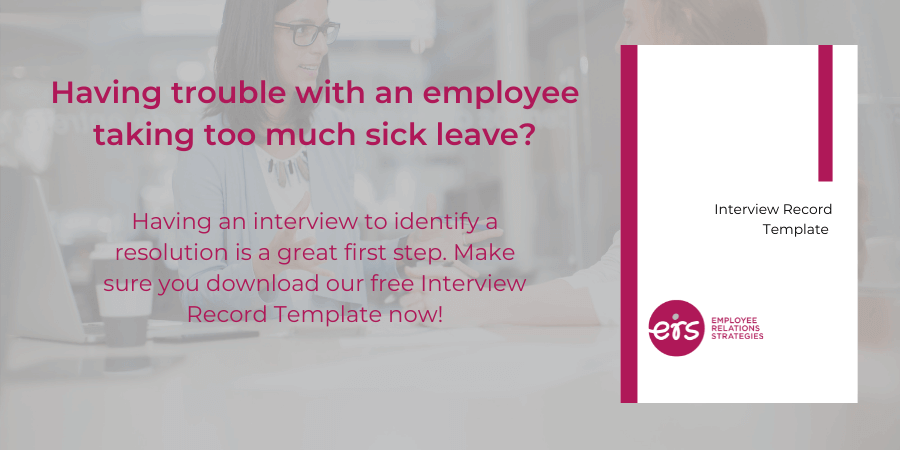It was reported (source: The Australian Chamber of Commerce and Industry) that 180,000 Australians were estimated to have called in sick for work on the recent Australia Day public holiday. While employees taking sick leave is a natural and necessary occurrence, it starts to become problematic when staff begin to abuse their right and take excessive amounts of sick leave.
One possible solution would be asking employees to provide a medical certificate each time they call in sick. However, with the convenience of bulk-billing medical centres, employees can easily obtain an ‘unfit for work’ certificate. After being provided with regular ‘unfit for work’ certificates around Fridays and Mondays, you might be wondering what more you can do to quash the ‘sickies’ problem.
Proceed with caution
Questioning the validity of an employee’s medical certificate should be handled with caution. Treating employees unfavourably based on their right to take sick leave can land you in the midst of a general protections claim.
Employees are protected from being terminated by their employer because the employee is “temporarily absent” from work because of illness or injury – “temporarily absent” is defined as a cumulative total of up to 3 months in every 12 month period, or longer if they still have a remaining entitlement to paid sick leave. In theory, an employee could be absent up to 25% of their work year and still enjoy this protection. In this situation, it’s the employer’s responsibility to disprove that the reason for the termination was the employee’s (legitimate) temporary absence – so getting your evidence right is critical. Stress leave is another area you need to be careful when dealing with.
To qualify, employees are required to provide a medical certificate or statutory declaration for the illness or injury within 24 hours after the absence commenced, or any longer period reasonable in the circumstances. The employee may also be required (for example, by an award or enterprise agreement) to notify the employer and substantiate the reasons for the absence.
The employee must provide evidence to the employer that they were genuinely entitled to sick leave. Generally, a medical certificate is a legal document that should satisfy the employer of an employee’s inability to work. This doesn’t mean that an employer can’t question the validity of the medical certificate, simply that it will be difficult for the employer to refuse paid sick leave if one has been provided, without contrary evidence.
According to The AMA Guidelines for Medical Practitioners on Certificates Certifying Illness 2011, the AMA says that a medical certificate does not have to include a diagnosis, on the basis that employers should recognise the right of their employees to keep details of their medical condition confidential. According to the AMA, “Employers should not expect to see a diagnosis on the certificate. Employers should also recognise that the certification by the medical practitioner of an employee’s unfitness for work is sufficient.”
Where the employee does provide a certificate, in exceptional circumstances an employer can require more information to be provided. This might include where they have put an individual employee on notice that “generic” unfit for work certificates will not suffice.
Qantas was found to have a right to ask a pilot on long-term sick leave for more than just a basic medical certificate. After the pilot was absent for 149 days, Qantas required him to provide a written report from his treating doctor indicating his diagnoses, prognosis, capacity to return to his pre-injury duties and an expected time frame. They were found to have respected the pilot’s rights by not challenging his entitlement to sick leave, but rather requesting further information to plan their roster and staffing levels since there was some ambiguity about the duration of the pilot’s sick leave and his potential of returning back to work.
How to spot a forged medical certificate
A discrepancy between the date the certificate was issued and the date the employee has been certified as being sick could be an indicator of a falsified certificate. Also look for photocopied certificates which could indicate some ‘creative’ work by an employee erasing certain information and inserting their own.
As an employer, you may receive information from employees, or other means, that a particular employee is planning on ‘taking a sickie’ on a certain day. As was the case for a bar tender who provided his employer with a medical certificate issued on 4 January to cover a sick leave period from 30-31 December. However, a photo on social media showed him participating in New Year’s Eve celebrations in the leave period instead. The employee was dismissed for misrepresenting the medical certificate and his unfair dismissal claim was unsuccessful.
In a similar case, the employee’s medical certificate did not contain the doctor’s provider number, so the employer contacted the doctor’s surgery. The employer was told that the employee had not seen the doctor. After an investigation, the employee was terminated for serious misconduct for falsifying a medical certificate, and then denying it, with her subsequent unfair dismissal claim also unsuccessful.
Is forging a medical certificate illegal?
Yes, forging a medical certificate is illegal, and employees could be prosecuted for it. It would likely mean that assuming the employer follows the correct procedures, an employee could be summarily dismissed. Read more on that here.
What does this mean for employers?
The court rulings in these cases show that a medical certificate from a qualified medical practitioner must generally be accepted. An employer can only reject a medical certificate in exceptional circumstances as expressed above.
If you suspect that an employee’s medical certificate has been falsified, you can contact the employee’s doctor. Although they may not share the employee’s diagnosis with you, you’ll be able to confirm that the employee has been seen by a doctor on the date provided and was certified unfit for work.
If an employee requests to take extended periods of sick leave and you are uncertain as to the reasoning or length of leave, it would also be reasonable to request further information, as might regular absences associated with weekends and public holidays.
Remember – “what is inspected, is respected”
Have your employees started taking frequent ‘sickies’? Employers can begin doing a number of things to put an end to the sickies culture in their workplace. Without processes in place to monitor and manage absences, employers can find themselves in a situation where an employee has been consistently absent for a long time, while still receiving full pay, without any questions being asked.
Employers should take an interest in excessive sick leave. Recording employee’s patterns of sick leave will allow you to decipher which employees may be abusing their entitlements, so that you can at least start requiring medical certificates from them.
However, beware knee jerk reactions – if you have now recognised a pattern of taking excessive sick leave amongst your employees, ensure you properly notify them that they must provide medical certificates in the future, before hastily jumping into any disciplinary action. Dismissing an employee here can also be extremely risky. We’ve seen plenty of cases backfire on the employer.



